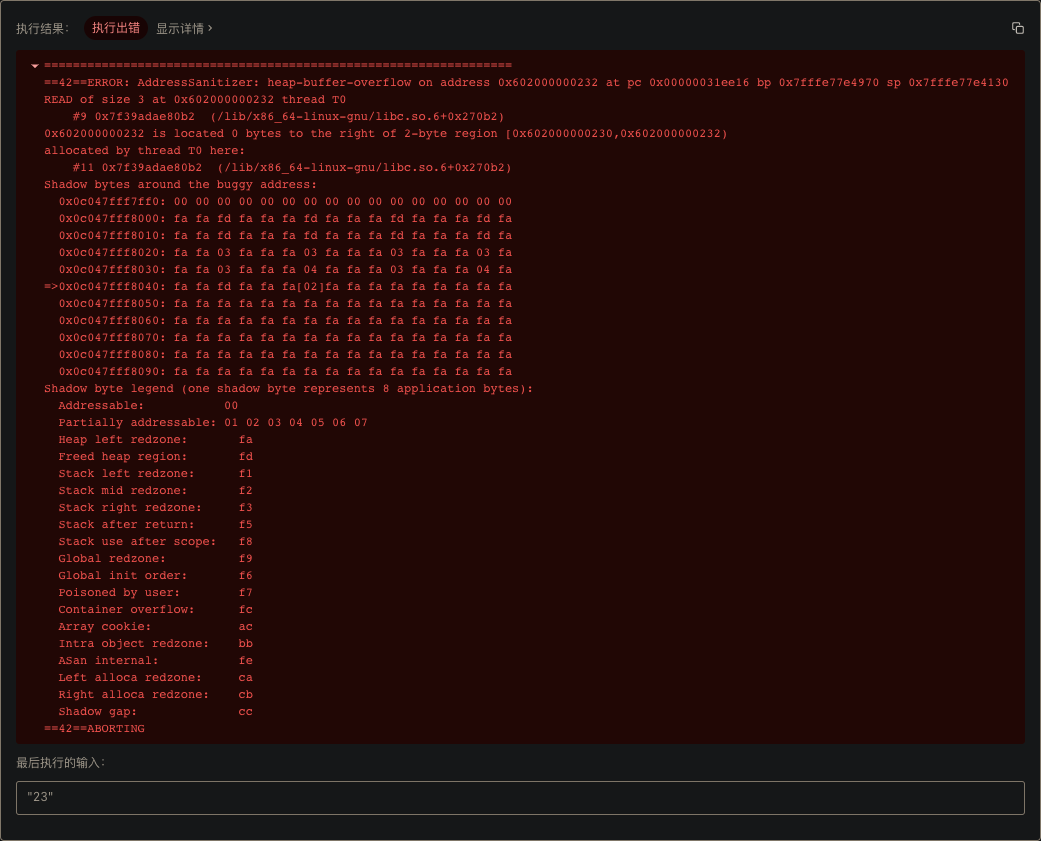1
2
3
4
5
6
7
8
9
10
11
12
13
14
15
16
17
18
19
20
21
22
23
24
25
26
27
28
29
30
31
32
33
34
35
36
37
38
39
40
41
42
43
44
45
46
47
48
49
50
51
52
53
54
55
56
57
58
59
60
61
62
63
64
65
66
| =================================================================
==30037==ERROR: AddressSanitizer: heap-buffer-overflow on address 0x602000000352 at pc 0x000100d2d634 bp 0x7ffeeef9eb50 sp 0x7ffeeef9e310
READ of size 3 at 0x602000000352 thread T0
#0 0x100d2d633 in wrap_strlen+0x183 (libclang_rt.asan_osx_dynamic.dylib:x86_64h+0x1a633)
#1 0x100c7ed98 in std::__1::char_traits<char>::length(char const*) __string:253
#2 0x100c7ed74 in std::__1::basic_string<char, std::__1::char_traits<char>, std::__1::allocator<char> >::basic_string<std::nullptr_t>(char const*) string:819
#3 0x100c653f8 in std::__1::basic_string<char, std::__1::char_traits<char>, std::__1::allocator<char> >::basic_string<std::nullptr_t>(char const*) string:817
#4 0x100c7da8a in leetcode_0017::Solution::backtrace(std::__1::basic_string<char, std::__1::char_traits<char>, std::__1::allocator<char> > const&, std::__1::vector<char, std::__1::allocator<char> >&, std::__1::vector<std::__1::basic_string<char, std::__1::char_traits<char>, std::__1::allocator<char> >, std::__1::allocator<std::__1::basic_string<char, std::__1::char_traits<char>, std::__1::allocator<char> > > >&) 0017.cpp:42
#5 0x100c7db38 in leetcode_0017::Solution::backtrace(std::__1::basic_string<char, std::__1::char_traits<char>, std::__1::allocator<char> > const&, std::__1::vector<char, std::__1::allocator<char> >&, std::__1::vector<std::__1::basic_string<char, std::__1::char_traits<char>, std::__1::allocator<char> >, std::__1::allocator<std::__1::basic_string<char, std::__1::char_traits<char>, std::__1::allocator<char> > > >&) 0017.cpp:49
#6 0x100c7db38 in leetcode_0017::Solution::backtrace(std::__1::basic_string<char, std::__1::char_traits<char>, std::__1::allocator<char> > const&, std::__1::vector<char, std::__1::allocator<char> >&, std::__1::vector<std::__1::basic_string<char, std::__1::char_traits<char>, std::__1::allocator<char> >, std::__1::allocator<std::__1::basic_string<char, std::__1::char_traits<char>, std::__1::allocator<char> > > >&) 0017.cpp:49
#7 0x100c70406 in leetcode_0017::Solution::letterCombinations(std::__1::basic_string<char, std::__1::char_traits<char>, std::__1::allocator<char> > const&) 0017.cpp:35
#8 0x100c6ff0b in leetcode_0017::main() 0017.cpp:59
#9 0x100c70b78 in main main.cpp:64
#10 0x7fff20336620 in start+0x0 (libdyld.dylib:x86_64+0x15620)
0x602000000352 is located 0 bytes to the right of 2-byte region [0x602000000350,0x602000000352)
allocated by thread T0 here:
#0 0x100d687ed in wrap__Znwm+0x7d (libclang_rt.asan_osx_dynamic.dylib:x86_64h+0x557ed)
#1 0x100c72b98 in std::__1::__libcpp_allocate(unsigned long, unsigned long) new:253
#2 0x100c78ed8 in std::__1::allocator<char>::allocate(unsigned long, void const*) memory:1869
#3 0x100c78db8 in std::__1::allocator_traits<std::__1::allocator<char> >::allocate(std::__1::allocator<char>&, unsigned long) memory:1586
#4 0x100c7e5ef in std::__1::__split_buffer<char, std::__1::allocator<char>&>::__split_buffer(unsigned long, unsigned long, std::__1::allocator<char>&) __split_buffer:318
#5 0x100c7e498 in std::__1::__split_buffer<char, std::__1::allocator<char>&>::__split_buffer(unsigned long, unsigned long, std::__1::allocator<char>&) __split_buffer:317
#6 0x100c7e079 in void std::__1::vector<char, std::__1::allocator<char> >::__push_back_slow_path<char const&>(char const&) vector:1623
#7 0x100c7dd45 in std::__1::vector<char, std::__1::allocator<char> >::push_back(char const&) vector:1640
#8 0x100c7db25 in leetcode_0017::Solution::backtrace(std::__1::basic_string<char, std::__1::char_traits<char>, std::__1::allocator<char> > const&, std::__1::vector<char, std::__1::allocator<char> >&, std::__1::vector<std::__1::basic_string<char, std::__1::char_traits<char>, std::__1::allocator<char> >, std::__1::allocator<std::__1::basic_string<char, std::__1::char_traits<char>, std::__1::allocator<char> > > >&) 0017.cpp:48
#9 0x100c7db38 in leetcode_0017::Solution::backtrace(std::__1::basic_string<char, std::__1::char_traits<char>, std::__1::allocator<char> > const&, std::__1::vector<char, std::__1::allocator<char> >&, std::__1::vector<std::__1::basic_string<char, std::__1::char_traits<char>, std::__1::allocator<char> >, std::__1::allocator<std::__1::basic_string<char, std::__1::char_traits<char>, std::__1::allocator<char> > > >&) 0017.cpp:49
#10 0x100c70406 in leetcode_0017::Solution::letterCombinations(std::__1::basic_string<char, std::__1::char_traits<char>, std::__1::allocator<char> > const&) 0017.cpp:35
#11 0x100c6ff0b in leetcode_0017::main() 0017.cpp:59
#12 0x100c70b78 in main main.cpp:64
#13 0x7fff20336620 in start+0x0 (libdyld.dylib:x86_64+0x15620)
SUMMARY: AddressSanitizer: heap-buffer-overflow (libclang_rt.asan_osx_dynamic.dylib:x86_64h+0x1a633) in wrap_strlen+0x183
Shadow bytes around the buggy address:
0x1c0400000010: fa fa 00 04 fa fa 00 00 fa fa 00 06 fa fa fd fd
0x1c0400000020: fa fa 00 00 fa fa fd fa fa fa fd fa fa fa fd fa
0x1c0400000030: fa fa fd fa fa fa fd fa fa fa fd fa fa fa fd fa
0x1c0400000040: fa fa fd fa fa fa 03 fa fa fa 03 fa fa fa 03 fa
0x1c0400000050: fa fa 03 fa fa fa 03 fa fa fa 04 fa fa fa 03 fa
=>0x1c0400000060: fa fa 04 fa fa fa fd fa fa fa[02]fa fa fa fa fa
0x1c0400000070: fa fa fa fa fa fa fa fa fa fa fa fa fa fa fa fa
0x1c0400000080: fa fa fa fa fa fa fa fa fa fa fa fa fa fa fa fa
0x1c0400000090: fa fa fa fa fa fa fa fa fa fa fa fa fa fa fa fa
0x1c04000000a0: fa fa fa fa fa fa fa fa fa fa fa fa fa fa fa fa
0x1c04000000b0: fa fa fa fa fa fa fa fa fa fa fa fa fa fa fa fa
Shadow byte legend (one shadow byte represents 8 application bytes):
Addressable: 00
Partially addressable: 01 02 03 04 05 06 07
Heap left redzone: fa
Freed heap region: fd
Stack left redzone: f1
Stack mid redzone: f2
Stack right redzone: f3
Stack after return: f5
Stack use after scope: f8
Global redzone: f9
Global init order: f6
Poisoned by user: f7
Container overflow: fc
Array cookie: ac
Intra object redzone: bb
ASan internal: fe
Left alloca redzone: ca
Right alloca redzone: cb
Shadow gap: cc
==30037==ABORTING
|



